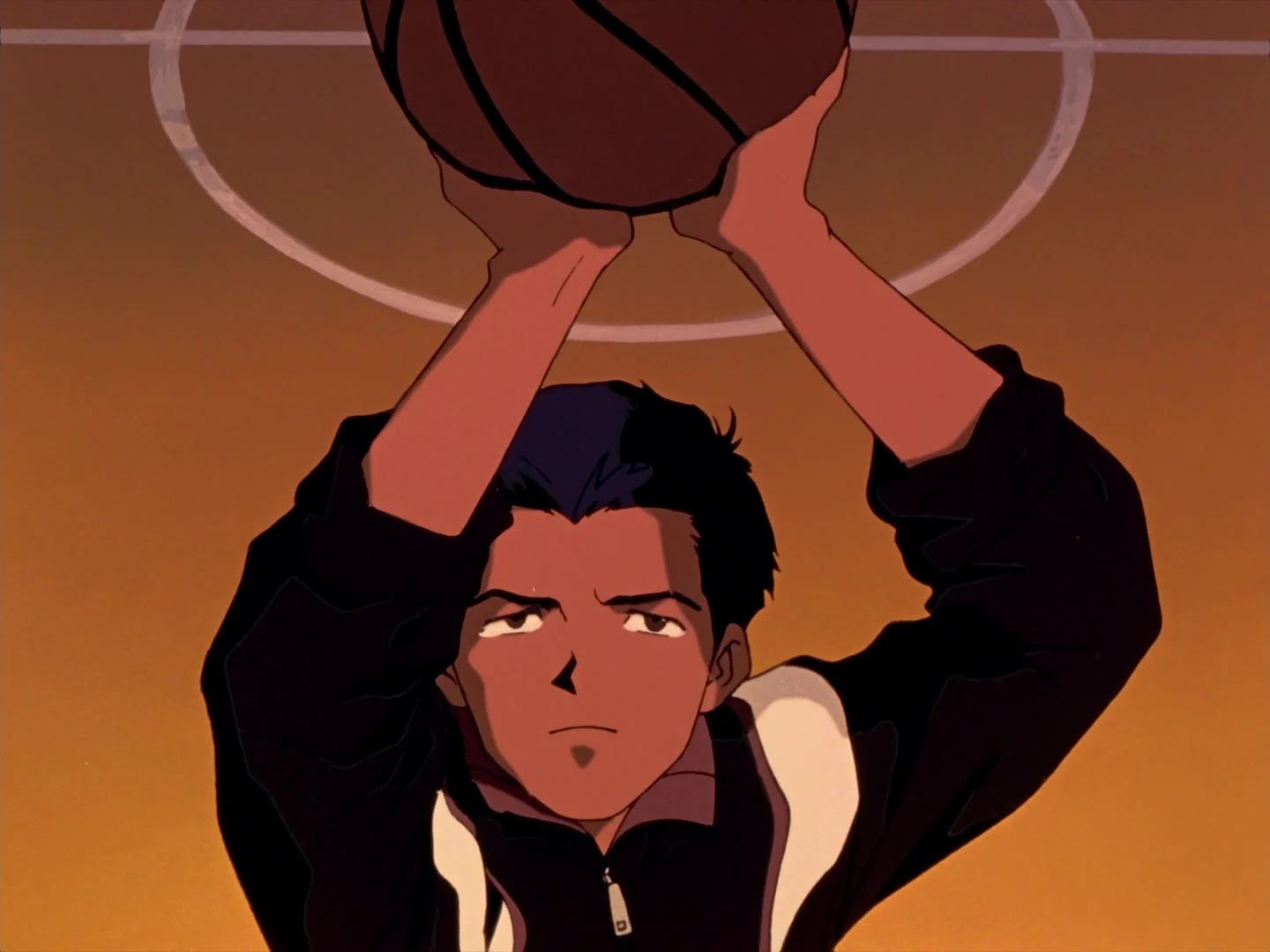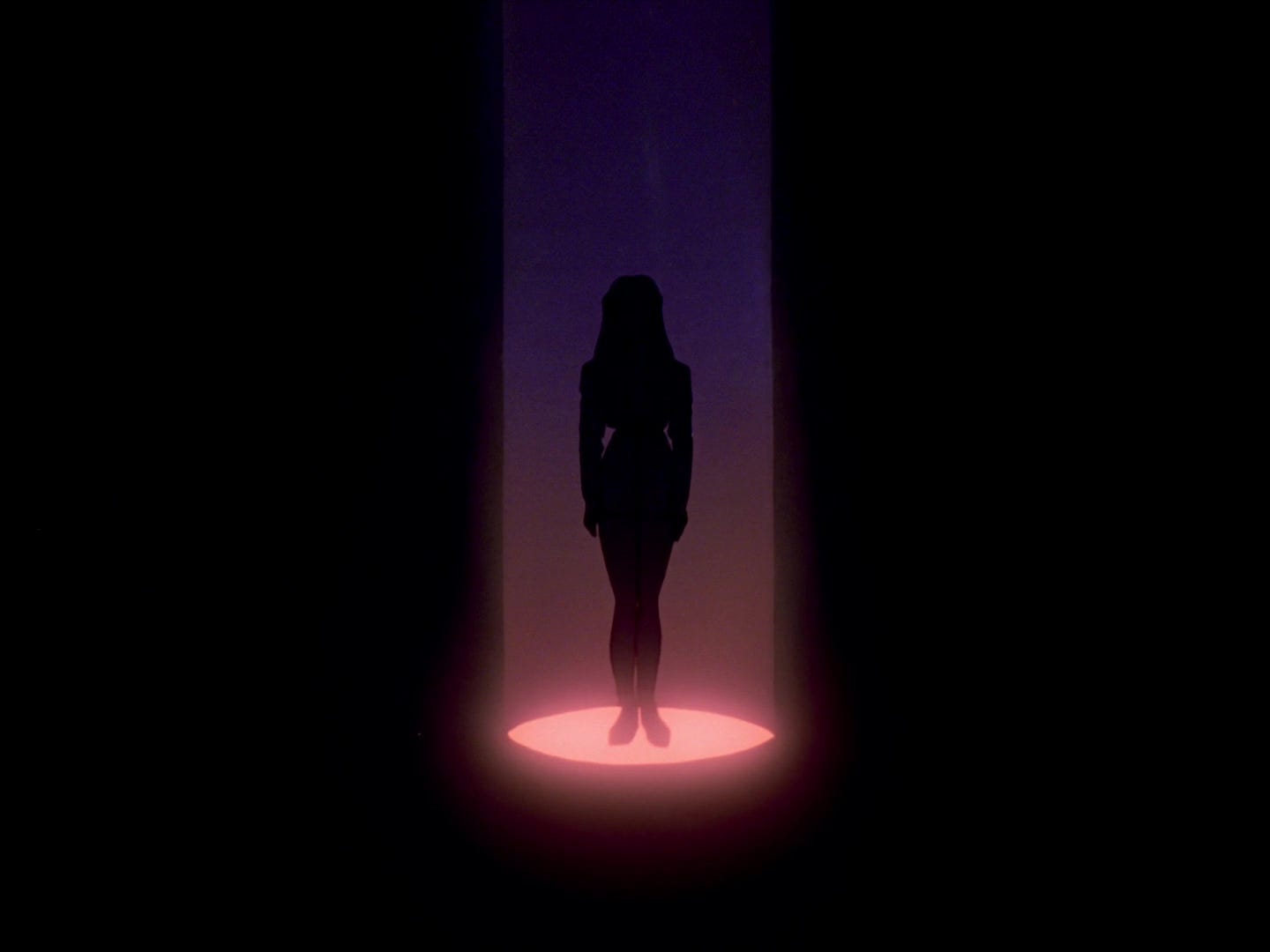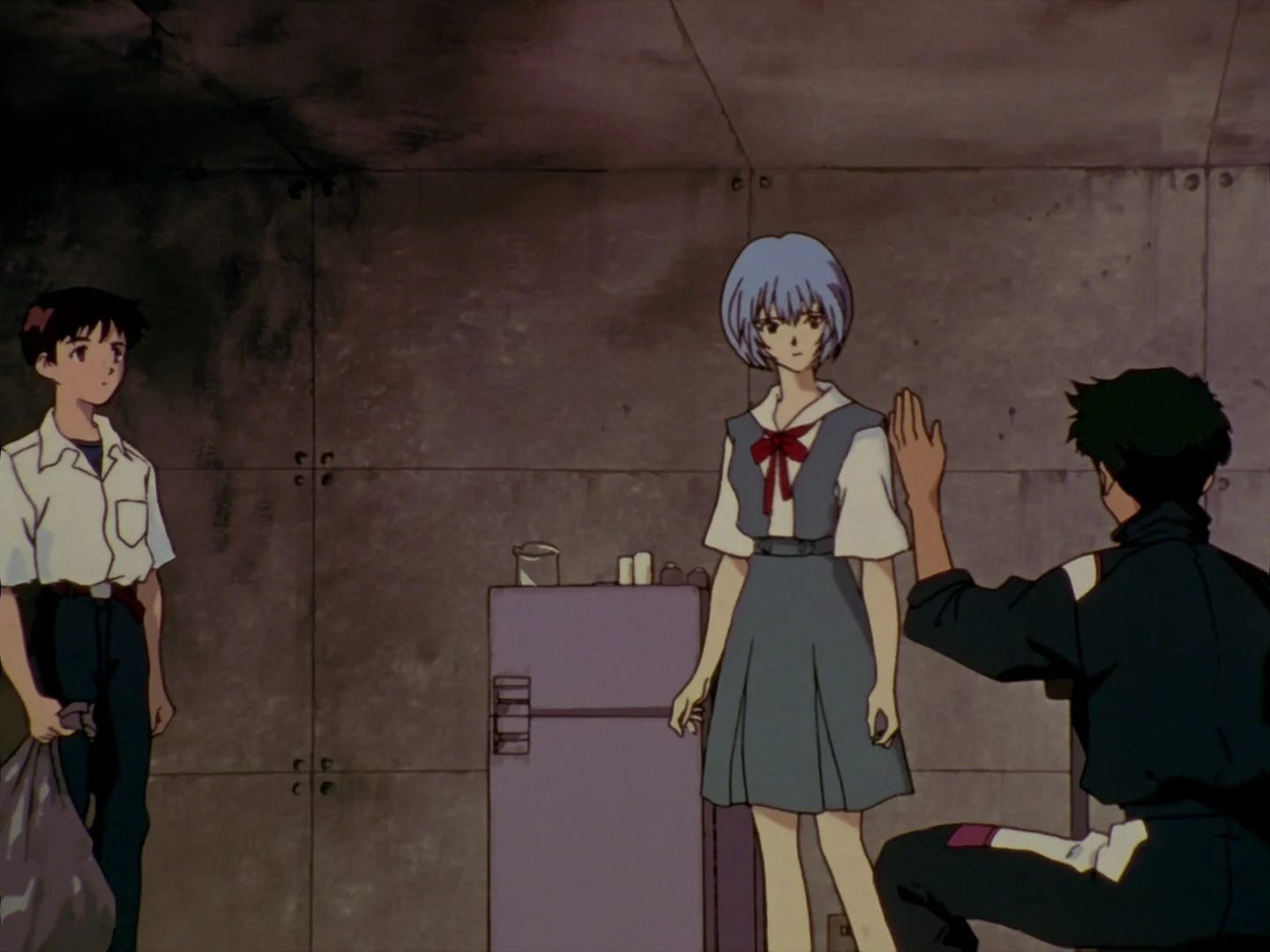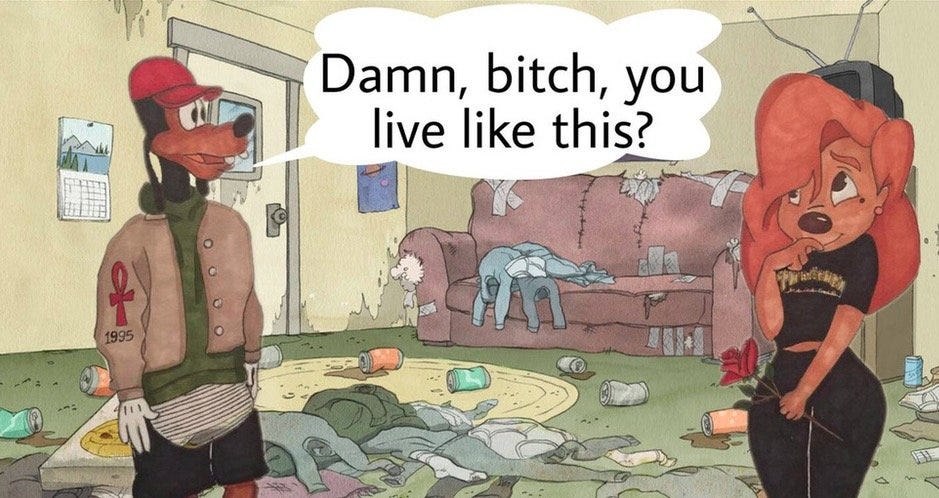you eva pilots are all weirdos
neon genesis evangelion (episode seventeen, "fourth children")
A new year, a new Netflix account, a new Evangelion post. Except… my workaround for taking screenshots stopped working! There’s always something.… (You can click through any screencap to be taken to the source I’m using.)
In this episode, the United States demanded the right to build Eva units themselves and somehow managed to wipe the entire U.S. branch of NERV from existence entirely.1 However, Unit 03 has survived and is on its way to Japan. The “dummy plug” system is also mostly complete now; these are, essentially, empty entry plugs that mimic Rei’s personality and her biodata. These “dummy plugs” will trick the Eva into thinking that there’s a pilot inside. But the dummy plug system is not totally complete, so they still need a fourth pilot for new Eva.
Nobody actually says the name of the fourth pilot until (I think) the end of the next episode, but you figure it out: it’s Toji, Shinji’s cranky friend. That is not a coincidence: Shinji’s whole class is, in fact, constructed to hold potential Evangelion pilots, though it seems like Toji is the first “pull” from the general population NERV has ever done.2 The episode ends with Toji silently reflecting on his fate, and Asuka (elsewhere) loudly protesting this act of aggression against her personally.
This is an odd episode. The decision (for instance) to make it clear who the fourth pilot is without having anybody spit it out—why? Everything in this episode is constructed around this silence. It feels ominous. (In the preview for the next episode, we even get a line to the effect of, everybody enjoys one last normal day.)
One answer is that the big thing nobody is saying makes you wonder about the other big things nobody is saying. Many alliances in this show are clearly fraying. Ritsuko discussing the dummy plug with Gendo feels as if she is trying to bait him into admitting something or saying something he will not say. Gendo and SEELE continue to mistrust each other. Rei seems to be troubled on some level with the possibility she’s transferred her loyalty to Shinji. Only Gendo and Fuyutsuki seem to remain on the same ground, and yet Fuyutsuki really seems to have no respect for Gendo at all. That’s not a big change—he has never seemed to respect Gendo, really—but it makes it doubly weird that theirs is the only truly solid relationship here.
Another one way of looking at this episode as a whole that Evangelion is deliberately baiting its audience with a potential reset back to “normal.” It’s giving us an obvious puzzle to solve—who’s the pilot?—and we solve it. We like Toji, he’s a normal guy, and it’s fun to imagine him shaking up our tight trio the same way Asuka disrupted the Shinji / Rei dynamic. (Plus, you know Kensuke’s not going to get left behind.) Meanwhile, Shinji seems bizarrely unshaken by his near death experience. Ritsuko and Misato are being civil to each other. Kaji is sexually harassing women again. Normal!
At the same time, we, the audience, don’t really want things to be “normal.” That is, we want a narrative with answers. We want to find out what’s up with “Adam” in the basement. We want to know why Shinji’s mom is in Unit 01. We love hanging out with our little pals but we also want to know what the hell is going on.
The question that sort of kind of started this whole series was, basically, what makes this story hard to end? Or at least, hard to end in a way everybody seems to find satisfying. The original TV ending gives you a complete story—it’s just that it was not the complete story a lot of people wanted. It provides an emotional resolution but leaves plenty of blanks. End of Evangelion gave people what they thought they wanted (more action!) but they weren’t happy with that either. The Rebuild movies seem to try to end the story again in their own way, but I mostly haven’t watched them, so we’ll see when we get there.
Part of the answer, I think, is visible in this episode. What many of us watching really want is for Evangelion to be a smarter, slightly weirder than usual robot show—like Hideaki Anno’s show before Evangelion, Nadia: The Secret of Blue Water, which was essentially an exceptionally well-made children’s show. But Evangelion isn’t Nadia; it is not an adventure story which we can feel confident will end in happiness. This is a story in which there will be losers, and those losers will not always be the people we want to see lose. That Toji agrees to become a pilot in exchange for better medical treatment for his sister underlines this. In the world of Evangelion, Toji is already a loser; he doesn’t seem to have the inside hookups Kensuke does. He agrees to be a pilot the same way a teenager without prospects signs up for the military.
Gendo worships Tokyo-3 as a testament to the strength of man—cast out of the Garden of Eden, we have erected a garden of our own—and yet he’s contemptuous of the people who actually live there (“it’s a city of cowards”). He is in a sense constructing a world actively hostile to the existence of Tojis—guys who want to play a little basketball and look out for their loved ones without engaging in life or death theatrics. Gendo’s ideal fortress is a perfect machine populated by no one, defended by robots without people in them, just as he prefers sterilized Antartica to the rest of the healing world.
In a couple episodes, Shinji will “overhear” a conversation between Gendo and Yui from when he was born. Gendo is very skeptical about the prospects of a baby brought into a post–Second Impact world; Yui says that if you’re alive, you can be happy. I thought about this watching this episode again, particularly when Kaji is taking care of his watermelons. One reason I like this show as much as I do is that it is resolutely on the side of living. “Life” isn’t about piloting a death machine; it’s about growing watermelons.
Next episode: Nothing is going to go wrong, we promise. It will all be totally fine.
The winner of the Still Frame Olympics in this episode is clear:
Do they study… anything… in class other than the fact that the Second Impact happened?
It’s interesting what I’ve totally forgotten—i.e., my jokes earlier about how everybody in Shinji’s classroom has a dead mom turn out to be reflective of the fact that Shinji’s school is itself a holding area for potential Eva pilots. Did I remember this? No, I did not.
Asuka’s lil cutie pie face she puts on for Kaji kills me… she looks like a Looney Tunes character.
This combination of characters feels illegal:
It’s a running question for me in the next few episodes what Gendo expected to have happen and what he can just roll with. However, American NERV simply disappearing feels like it’s not even something that merits “can roll with”—he’s not even disturbed.
A hint that things are not going to go smoothly: Evangelion seems to have a strong preference for trios…. Not quartets (or dyads).
Toji walking into Rei’s apartment is basically literally this meme:
Kind of heartwarming how (almost) all the women in Evangelion are slobs, really. Hideaki Anno is a #male #ally. Maya is probably pretty tidy (her desk seems to be), but chain-smoking Ritsuko? Tthe walls of her apartment are probably yellow.3
I genuinely love whenever Americans show up in something by Hideaki Anno—we are always annoying, and yet, I sense a lingering irrepressible affection…
You could maybe argue Asuka is also from the general population compared to Shinji and Rei.
My life overlapped with people smoking a lot indoors just enough that I can in fact remember nicotine stained walls.







“Only Gendo and Fuyutsuki seem to remain on the same ground, and yet Fuyutsuki really seems to have no respect for Gendo at all. That’s not a big change—he has never seemed to respect Gendo, really—but it makes it doubly weird that theirs is the only truly solid relationship here.”
I think a central pessimism in this show is that actually knowing and connecting with other people leads to disappointment. Thinking about End of Evangelion in particular here, but the actual close relationships in this show involve some level of antipathy. The optimism, I think, comes in where accepting this as the cost of being with others is worth it.
Triads might be fundamentally more stable for introverted people who find it difficult to connect with others, because its a small enough group to maintain deep emotional intimacy, but there is always a buffer between you and each other person, just in case stuff gets too real.